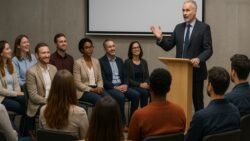Academic Philosophy – The philosophy of knowledge has evolved significantly over the centuries, and our institute has always strived to stay at the forefront of this transformation. Beginning with the foundations of classical epistemology, where philosophers questioned the sources, limits, and justification of human knowledge, the journey has expanded into contemporary fields that integrate logic, psychology, and cognitive science. At our institute, we believe in exploring these transitions not just as historical developments but as living dialogues that continue to shape how we think, learn, and understand the world today. The academic philosophy here is not confined to abstract debates but is deeply rooted in practical engagement—how humans perceive truth, construct rational beliefs, and apply reasoning in everyday life. This approach allows us to bridge timeless philosophical questions with pressing modern concerns, from artificial intelligence to human decision-making, ensuring that our students and scholars engage with epistemology as both a tradition and an evolving discipline.

 Workshops for Educators: Teaching Epistemology and Critical Thinking in Schools and Colleges
Workshops for Educators: Teaching Epistemology and Critical Thinking in Schools and Colleges
Bridging the Gap Between Tradition and Innovation
Our institute places strong emphasis on showing how the rich traditions of classical epistemology serve as stepping stones to today’s questions in cognition and reasoning. The works of Plato, Aristotle, Descartes, and Kant are studied not merely as historical documents but as sources of insight that still inspire academic dialogue. However, we equally highlight the significance of modern advancements, from cognitive psychology to neuroscience, which offer new tools to examine the human mind. By weaving classical frameworks with contemporary scientific approaches, we aim to create a holistic model of knowledge that acknowledges both enduring philosophical problems and the latest empirical findings. This synthesis encourages students to see epistemology not as a closed system but as a vibrant field that continues to adapt and grow in relevance with every generation of inquiry.
Interdisciplinary Engagement and Academic Philosophy
The academic philosophy of our institute thrives on interdisciplinarity. We encourage students and researchers to see beyond disciplinary boundaries, recognizing that questions of knowledge and truth intersect with linguistics, artificial intelligence, sociology, and even political theory. Our faculty’s research projects often involve collaborations with cognitive scientists, logicians, and computer scientists, ensuring that the study of epistemology is never isolated. The goal is to examine cognition in ways that blend rational analysis with scientific data, offering a fuller picture of how knowledge functions in diverse contexts. This approach prepares students to apply epistemic principles not only in philosophical debates but also in addressing practical challenges such as misinformation, ethical decision-making in technology, and the philosophy of science in contemporary society.
Pedagogical Approaches and Student Experience
A core feature of our institute’s philosophy is the emphasis on pedagogy that brings theory into practice. Students are not only taught abstract concepts but are actively involved in seminars, debates, and case-based learning activities that simulate real-world problems. This method ensures that epistemology is understood as a living subject that directly impacts how we navigate information and truth in daily life. For example, discussions may involve analyzing media credibility, applying formal logic to public discourse, or understanding how cognitive biases influence decision-making. Through such experiences, students learn that epistemology is not an isolated academic pursuit but a guiding framework for critical thinking, ethical reasoning, and informed citizenship.
Preparing for the Future of Knowledge
As we look ahead, our institute continues to evolve its academic philosophy to meet the demands of a rapidly changing intellectual landscape. The rise of digital technology, artificial intelligence, and global interconnectedness raises urgent questions about what it means to know, believe, and reason responsibly. We prepare our students to engage with these challenges by equipping them with both the classical foundations of epistemology and the modern tools of cognitive science. The vision is to create a generation of thinkers who are not only aware of the philosophical roots of knowledge but also skilled in applying epistemic principles to shape a just, rational, and ethical future. In this way, the journey from classical epistemology to contemporary cognition becomes not just a historical trajectory but an ongoing mission of our institute.



